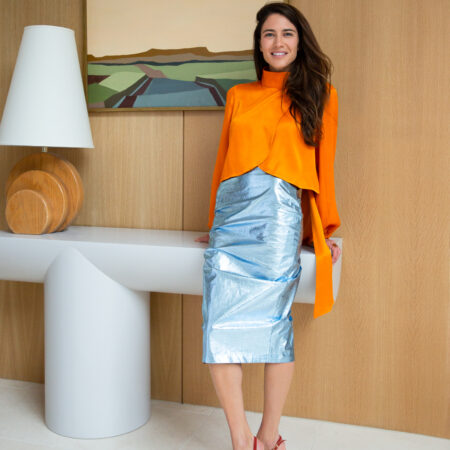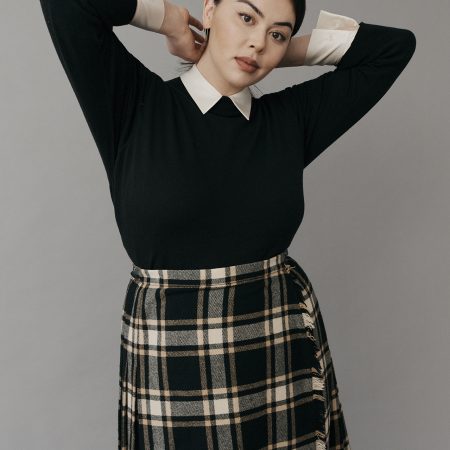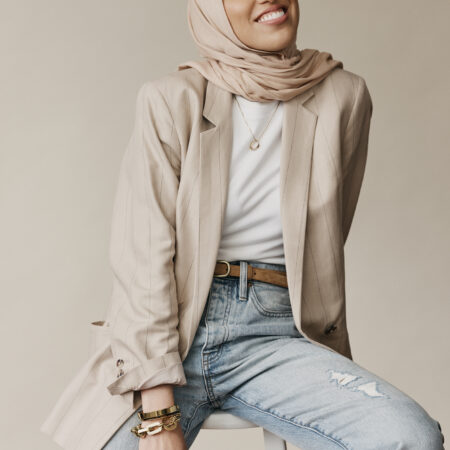How do you decide to become one of the first women of color to go on the record with sexual assault allegations in the wake of the #MeToo movement? For Drew Dixon, a former music executive and producer at Def Jam Records who, in 1995, was victim to prolonged alleged sexual harassment by her direct supervisor, the hip hop mogul Russell Simmons, this question is at the center of her coming out story. It’s also a question that filmmakers Amy Ziering and Kirby Dick (The Hunting Ground, The Invisible War) hope to answer in their latest documentary, On the Record, which shares the stories of three women who publicly accused Simmons of sexual assault.
Despite making headlines earlier this year after Oprah Winfrey, days before the film’s Sundance premiere stepped down as executive producer and Apple TV + dropped out as the distributor, the documentary will now premiere on HBO Max on May 27. At its surface, the film chronicles the traumatizing experiences of Simmons’ victims, but at its core, the story is an unfurling of the burden that women of color have historically carried by staying silent and bearing abuse at the hands of black men. “It’s a devastating position to be in,” explains Kierna Mayo, former editor-in-chief of Ebony magazine and On the Record contributor. “I’m hoping the aftermath of this film allows a conversation that enters black men into the dialogue in recognition of what black women have long had to bear.”
Ahead of the film’s highly anticipated release, we spoke with Mayo, one of the few women who experienced some of the earliest phases of hip hop journalism, and who, through several candid interviews with Amy Ziering, offers a historical and cultural context for the film. Here, she reveals what Russell Simmons’ accusers going on the record means for black women, how she thinks the “Oprah drama” will impact the way the victims’ stories are received, and why “the fullness of the #MeToo movement will never be realized if we don’t make space for black women’s truth.”
The initial 2017 New York Times investigation that detailed Drew Dixon’s account was not only one of the first #MeToo stories to come out about the music industry but Dixon was one of the first black women to go on the record about sexual assault allegations. Why did it take so long?
Young women today have the advantage of being sensitized in a way that my generation of young women really didn’t have. Meaning, 25 or 30 years ago, we didn’t have the language that we have today to really be clear around sexual assault and violations of this nature, but we also didn’t even have the permission to have the conversation. Even the most so-called woke of us—those of us who were black feminists—we spent a lot of time talking about misogyny, but on the question of rape and tolerance, we were impossibly tolerant when we should not have been. I mean, don’t get me wrong, it didn’t take #MeToo for us to understand that this sexism and this level of patriarchy was dangerous. It was a survival mechanism and it’s how most of the black women of that time even survived those years. We laughed off a lot of shit, we really did.
"It's how most of the black women of that time survived those years. We laughed off a lot of shit."
In the film, Drew says she felt like she had to stay silent to “take one for the team,” and Kimberlé Crenshaw says, “your responsibility [as a black woman] to muffle your screams is greater than [a black man’s] responsibility not to do it in the first place.” As the film continues to discuss, this so vividly shows how black women have, silently, carried the burden of black men.
That’s one of the reasons I’m so proud to be affiliated with [this film]; it’s really the first time in this commercially public way that we’re introducing this theory into the conversation. This has been black womens’ plight since we’ve been here; my mother felt it, her mother before her felt it. We, as black people—black men and black women—are subjugated, persecuted, denied, hurt, killed. You name the crime, we have suffered it as a community. That’s from outside forces, but what happens when, internally, one half of the community is subject to some of those same violations from the other half of the community? It’s a unique position to be in as an American and I think that America misses this point. This is why it’s been an isolated sensation, feeling, and dialogue that has happened only among black women with black women. And really, no one has heard this perspective, of how trying it is to be stuck between these two poles.
I can never wake up any less black or any less female on any given day; that’s just my identity, it is what it is and I roll with it. In this world, we really did suppress a lot subconsciously just to be in companionship and relationship with our brothers; it’s a devastating position to be in. I’m hoping the aftermath of this film allows a conversation that enters black men into the dialogue in recognition of what black women have long had to bear—it’s an important conversation for black men to have some onus around and to ‘talk to their people.’ To take the burden off black women and to prove ourselves as allies to our own people, we have to be able to speak our truth and to make an allegation that someone did something to us. We should all have that right and should be safe in our communities in just being truth-tellers. It takes a lot of courage to do what these women [in the film] did. It even took courage for those of us who were there as experts to show up.
How do you reconcile with your own experiences and opinions that you have of someone like Russell Simmons when you learn of something like this?
It’s a process. I also can’t listen to Michael Jackson or R. Kelly the same. I love Woody Allen as a filmmaker and can’t really get through it. I can try to separate the allegations from how I perceive the art and contributions of a person, but it’s not easy. Like Drew says, she wanted Russell to be a hero and she loved him, she loved the culture and she loved him. That stuck out for me because I feel the exact same way.
I mean, we’re talking about Russell specifically but in a way he is almost a symbol for so much. This idea of power that many of us had proximity to; as a young person, having proximity to creative people who then translate their own art into a lucrative life is nothing short of impressive and impactful. And it changes you, it really does. Like, on a cellular level, having proximity to certain levels of success changes the way you move through the world. Russell has gifted me his art, his work, his story, but nonetheless I’m being called to re-examine those years and those stories. I refuse to exalt anyone no matter what they’ve contributed to my life and my perspective on life. If I find out that you are a violent person, a harmful person, an abuser, I just have to be black and white about that.
Black and white in that there’s no room to negotiate those feelings?
Well, I think for a lot of folks there’s the confusion of that. But I’ve trained myself to not hold as much space because, more than anything, it hurts so damn bad. In that sense it’s almost easier to be black and white about it, but it’s an evolution. It gets easier with time to erase Bill Cosby from your psychic memory. It gets easier with time to do the same for all of these men. And black men, as a black woman, have more resonance with me and are closer to my heart. So that’s why the loss is greater.
"Having proximity to certain levels of success changes the way you move through the world."
Right before On The Record premiered at Sundance earlier this year, Oprah dropped out as an executive producer, reportedly due to perceived “inconsistencies” in Drew’s account and that she felt that there was “more work to be done on the film to illuminate the full scope of what the victims endured.” What did you think of these concerns? Was there any validity to them?
I never knew what those concerns were, but listen, we all talked about Oprah and as black women, we all have a relationship to her, speaking generally. When I think of Oprah, I think of her as a fully grown woman who makes intelligent decisions that first work for her and then work for the people around her. I have to believe that something transpired that brought her to that decision. That said, it was still jarring and somewhat disappointing. Mostly because these stories have to be told. But I, again, could separate her from the greater good, which is the story. Millions of people can experience [the film] and judge for themselves what they think about the women, what they think about Russell, what they think about the larger issues. From my perspective, the most important thing was that this film saw the light of day. And I’m just really happy that’s the case and I hope that the conversations about what did or didn’t happen with Oprah don’t cloud anything.
One thing I can say, I just watched it again for the first time in months and because I’ve been a writer and a cultural critic for so long, I can say almost objectively not a hundred percent but almost objectively, this film stands up. It speaks for itself, with or without Oprah. In the end, that’s the biggest headline, and if that’s why folks get an opportunity to view it, then they can ask themselves if that earlier controversy even means anything anymore. Because once you see the gravity of the story, that just becomes noise. I was at Sundance [for the film’s premiere]; we were all in tears, it was a double standing ovation. It was radical. We, who were in the film, felt such joy for the survivors, because it seemed like a validation that we have all held in our hearts, validating their stories, believing, and bringing it to the public. Seeing people really receive the film in that way… we were all so grateful that, if only in that moment, the survivors, could feel a sense of peace.
"I'm totally into this new wave of feminism of black women who are intellectual and ratchet and all the things in between."
This film is made by Kirby Dick and Amy Ziering, two documentary filmmakers who have previously highlighted the stories of silenced women. Do you think it’s important to have a female filmmaker shedding light on a story like this? How do you think it shapes the way these women’s stories are told?
Certainly. Amy and Kirby are pros; they support women who come forth and tell their stories, so this part of it wasn’t new for them. But I was very anxious about being on camera. Had it not been for Amy’s really delicate hands I just don’t think she would’ve gotten that out of me. I can only speak for myself, but only a woman who has interviewed me would make me feel safe enough to share what I shared. Particularly about Russell Simmons who holds such a premium position in the hearts and minds of so many people that I actually love and respect personally. Amy was strong and delicate if that makes sense. She approached this as a journalist who was sensitive and patient and didn’t feed anything, she just allowed the space for you to feel what you were feeling and let it fall out. I was apprehensive and not sure what I was really going to say. I had convinced myself that I was going to be really buttoned up, and clearly, when I see myself on it now I’m like, “Okay, Amy’s good at what he does because she got me to open up.” It had to be a woman.
I also think a lot has changed in 20 years. Younger women, in particular, because that’s the real measurement, feel more empowered and have more agency. They don’t seem as exploited—even in a sexual context, even in a hip hop context, you can feel the agency. And I think it took my generation for [women] to get to a place where there’s a Megan Thee Stallion and Beyonce Remix. You know? I’m totally into this new wave of feminism, especially among black women who are just intellectual and ratchet and all the things in between. We are allowing ourselves to be our full selves on our own terms, which is a very different dynamic.
"Interracial gender dynamics where abuse lives and where sexual assault thrives has to be beat back."
Ultimately, what do you hope viewers will take away from seeing this film?
I’m hoping that for my community, this is stepping out of the darkness and into the light. Whenever we’re speaking truth to power, that creates a path forward for those coming behind us and this is definitely an act of speaking truth to power. We have to reconcile…this isn’t going to go away until we make it go away. Interracial gender dynamics where abuse lives and where sexual assault thrives has to be beat back. I hope that this film does its part in doing that, that if some woman or girl were ever in a situation that led to this, that she could feel empowered to tell somebody and be believed.
And on the back end, there would be a repercussion for the person who aggrieved her, whatever that looks like. I’m hoping that the men in the black community are also able and willing to confront this truthfully, honestly, and courageously. As courageously as the women who are telling their stories have been, that’s my greatest hope; that there’s communal, community transformation. No more denial. The fullness of the #MeToo movement and of this time will never be realized if we don’t make space for black women’s truth. For women of color, for poor women, for queer women, if there’s no space for these stories of survival, this movement cannot thrive. We cannot create transformation without everyone being allowed a platform to be heard and recognized and validated.
*This interview has been edited for length and clarity






